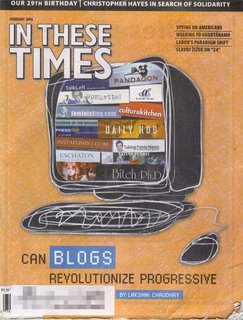Thursday, February 16, 2006
Perspectives on Political Blogging
 A recent cover story on political blogging in In These Times prompts me to muse a little on my perception of "political" blogs.
A recent cover story on political blogging in In These Times prompts me to muse a little on my perception of "political" blogs.The meaning and influence of blogs, even the so-called A-list blogs, is difficult for me to assess because I have a condition I'm calling "anti-popularism." This means the more popular and broadly appealing something is, say, a film, the more likely I will find it mediocre or actively dislike it. I don't think this is because it is popular but rather an effect of the qualities necessary for wide popularity. I like to believe it's not just a contrarian streak or sheer curmudgeonly meanness.
This ties in with the center-left political blogs because I usually visit them a few times and then tend to drift away. Are they doing good things? I guess. Are they affecting the mainstream political dialogue? I guess. Are they encouraging political activism? I guess. But I can't really remain interested in these blogs because they generally want to influence the Democratic Party. At their core, they are usually leftish Democrats. I understand the realities of the electoral system: the Democratic Party is established and probably has the best possibility of widespread and continuing electoral and Congressional challenges to the Republicans. But that isn't enough for me. The far left positions of the Democrats only just start to meet up with my political interests and desires.
So I've visited Kos and MyDD a few times but didn't see anything to keep me coming back. If pointed at a particular article, I might go read it. Otherwise, I'm almost oblivious to such sites.
The focus of the ITT article was on blogs' ability to organize grassroots. My understanding is that Kos was a mite peeved by the tone of the article. Lakshmi Chaudhry, the author of the ITT piece, speaks to this in a discussion on The ITT List.
Can blogs create a truly effective grassroots movement? Within this context, the fact that the blogosphere remains predominantly the realm of white, well-educated males represents a challenge to be overcome. So the "tedious whining" charge makes the article sound like some rant from some unhappy Indian chick, when it's an extensively reported, researched piece that does its best to offer a fair assessment of an important political phenomenon. And it says nothing about the broader question of effectiveness. So it doesn't really add to public knowledge of the issue or carry the discussion forward. But rather suggests that any attempt to even raise the issue of representation is to be dismissed outright, irrespective of its context. The Republicans do that well enough without our help.ITT often has a strong labor/union editorial perspective so it is unsurprising that the focus on effective grassroots organizing is central to the article. While they are certainly entitled to that opinion, the value of blogs is not just about unifying and directing people toward political action but in exploring different options, sometimes very obscure options. The amazing thing is these explorations can be made available to be widely read and debated in blogs. Time was you really had to search, and search hard, to find information on non-mainstream political views. Now, you can find a Wikipedia entry on Anarchism or go to a Green Party site.
Not all political discussion or dialog needs to result in concrete steps or easily categorized goals or effective action. Sometimes the discussion needs to happen to lay a groundwork, a foundation for future action. I, for one, will probably not be happy with the Democratic Party or its goals, no matter how much it changes direction. Will I still vote for Democratic candidates if they are the only choice? Probably. But I feel it's futile to put my daily political energies into influencing the party. In that sense, they lost me a long time ago.
On a slightly different topic, the ITT cover graphic above includes 14 specific blogs. I admit to feeling a little smug that I was familiar with 13 of them (and visit 7 of them regularly). The only one I was unfamiliar with was also a bit difficult for me to find from its logo. I'm glad I looked. Afro-Netizen is "dedicated to informing, inspiring, and engaging afro-netizens and the communities they touch." Check it out.
 The CR FAQ - An Introduction to Celtic Reconstructionist Paganism
The CR FAQ - An Introduction to Celtic Reconstructionist Paganism





